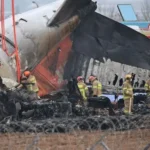In the quiet town of Coalcoman, a seemingly innocuous banner thanking a powerful figure has sparked national outrage and a government investigation. The sign, displayed during a local event, expressed gratitude to Nemesio “El Mencho” Oseguera—one of the world’s most feared cartel leaders and head of the Jalisco New Generation Cartel—for providing gifts to children.
What appeared to be a simple gesture of generosity now casts a shadow on the integrity of local leadership. The banner’s message, which read, “The children of Coalcoman thank Mr. Nemesio Oseguera and his family for their noble gesture,” has drawn sharp criticism from Mexico’s President Claudia Sheinbaum, who announced an inquiry into Mayor Anavel Avila’s potential ties to the criminal organization.
“This government does not and will not tolerate any glorification of criminal activity,” Sheinbaum stated during a press conference. “The investigation will uncover why this banner was permitted and if there are deeper connections at play.”
Such events highlight a troubling trend in which cartels use public relations tactics to cement their influence in vulnerable communities. Distributing gifts, food, and other aid is a common strategy employed by criminal organizations to gain local support, especially in areas where government resources are scarce.
Experts warn that these acts of so-called “charity” mask a darker agenda, enabling cartels to operate more freely in regions where they are viewed as benefactors rather than oppressors. During the COVID-19 pandemic, reports of cartel-led relief efforts—such as food deliveries—surfaced across Mexico, further illustrating how these groups exploit moments of crisis.
While the government condemns these actions, dismantling the pervasive influence of cartels remains a monumental challenge. Mexico’s battle with organized crime has claimed hundreds of thousands of lives since 2006, and incidents like this expose the enduring grip these groups have on local communities.
Internationally, the issue is drawing attention as well. The United States is ramping up pressure, with U.S. President-elect Donald Trump promising to designate Mexican cartels as foreign terrorist organizations, a move that could redefine cross-border strategies in combating organized crime.
As Coalcoman becomes the focal point of this latest controversy, the investigation into Mayor Avila’s role—and the broader implications of cartel involvement in community affairs—continues to unfold, shining a light on the complexities of governance in a nation grappling with deep-seated corruption and violence.






